小升初四大时态及习题
小升初英语四大时态复习讲解及真题专项练习含答案
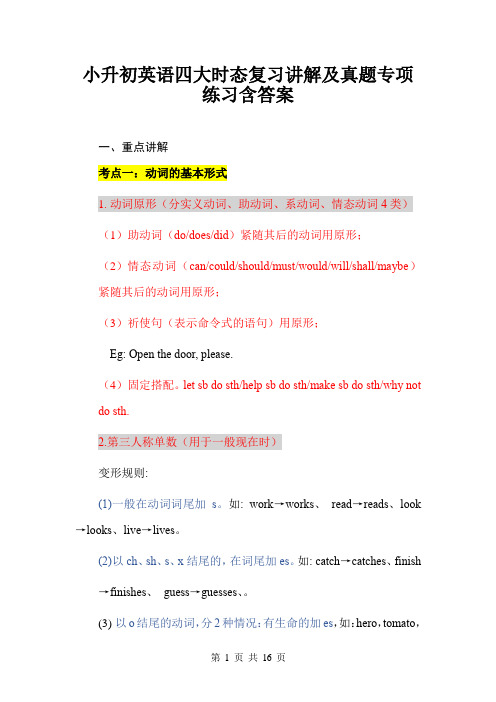
小升初英语四大时态复习讲解及真题专项练习含答案一、重点讲解考点一:动词的基本形式1.动词原形(分实义动词、助动词、系动词、情态动词4类)(1)助动词(do/does/did)紧随其后的动词用原形;(2)情态动词(can/could/should/must/would/will/shall/maybe)紧随其后的动词用原形;(3)祈使句(表示命令式的语句)用原形;Eg: Open the door, please.(4)固定搭配。
let sb do sth/help sb do sth/make sb do sth/why not do sth.2.第三人称单数(用于一般现在时)变形规则:(1)一般在动词词尾加s。
如: work→works、read→reads、look →looks、live→lives。
(2)以ch、sh、s、x结尾的,在词尾加es。
如: catch→catches、finish→finishes、guess→guesses、。
(3)以o结尾的动词,分2种情况:有生命的加es,如:hero,tomato,potato;没有生命的加s,如:radio,photo。
(4)以辅音字母加y结尾的动词,变y为ies。
如: fly→flies、study →studies、carry→carries.(5) 不规则变化。
如: have→has ,are→is,were→was3.现在分词(用于现在进行时)变形规则:(1)一般在动词后加ing。
如: work→working、read→reading、look →looking、wait→waiting。
(2)以不发音的e结尾的动词,去掉e,再加ing。
如: smile→smiling、move→moving、take→taking、write→writing。
(3)以重读闭音节结尾的且词尾只有一个辅音字母的,双写这个辅音字母加ing。
如: sit→sitting、stop→stopping、cut→cutting、run →running、swim→swimming.(4)少数几个以ie结尾的动词,将ie改为y加ing。
四种时态及其练习(完整版)
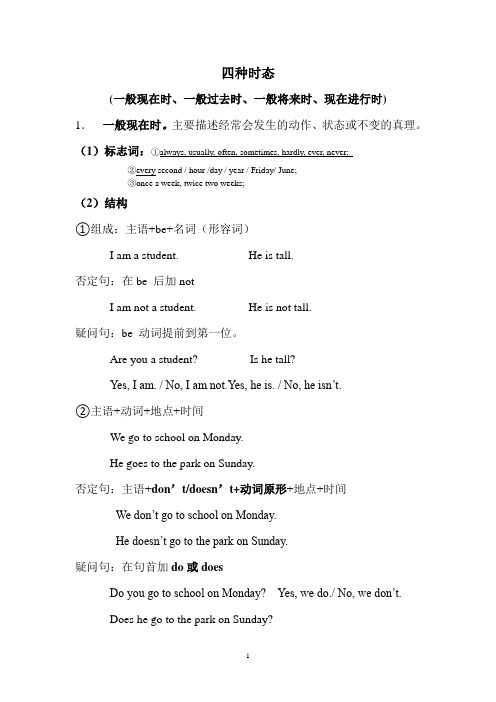
四种时态(一般现在时、一般过去时、一般将来时、现在进行时)1.一般现在时。
主要描述经常会发生的动作、状态或不变的真理。
(1)标志词:①always, usually, often, sometimes, hardly, ever, never;②every second / hour /day / year / Friday/ June;③once a week, twice two weeks;(2)结构①组成:主语+be+名词(形容词)I am a student. He is tall.否定句:在be 后加notI am not a student. He is not tall.疑问句:be 动词提前到第一位。
Are you a student? Is he tall?Yes, I am. / No, I am not.Yes, he is. / No, he isn’t.②主语+动词+地点+时间We go to school on Monday.He goes to the park on Sunday.否定句:主语+don’t/doesn’t+动词原形+地点+时间We don’t go to school on Monday.He doesn’t go to the park on Sunday.疑问句:在句首加do或doesDo you go to school on Monday? Yes, we do./ No, we don’t.Does he go to the park on Sunday?Yes, he does./ No, he doesn’t.(3)动词三单变化:①在原单词末尾加s , 如:like –likes②单词以o, sh, ch, s, x 结尾加es, 如:go –goes③单词末尾为辅音+y结尾去y加ies 如:study- studies2. 现在进行时:主要叙述正在发生的事情。
小升初专题复习1之四大时态教师版

小升初专题复习1之四大时态一、一般过去时1、定义:表示在过去的时间里发生的动作或状态2、构成:主语+ 动词过去式+其他动词过去式的构成1) 直接加-ed watch--- watched2)以e结尾的动词,加-d live--- lived3)以辅音字母加y结尾的,变y为ied study--- studied4)辅元辅”结尾的,双写加-ed stop--- stopped5) 不规则的构成(详见课本不规则动词表)3、一般过去时的时间标志词4、解题技巧:在句子或题目中看见last /yesterday/ before/ago / in+过去的时间系列的时间词巩固练习一、填空题1、In 1990,they ___________ ( go ) to school by sled. Because the ferry ___________ (not work).2、He ___________ (get) up and looks at his face yesterday.3、It ___________ (be) really interesting last week.4、I ___________ (visit) my grandparents last summer vacation.5、Yesterday morning I ___________ (have) a science lesson.6、My sister Sarah ___________ (eat) a hamburger last Friday.7、Last year Tom and Tim ___________ (make ) a big surprise for their mother.8、We ___________(climb) the mountain last week with my family.9、--- ___________ you ___________your homework yesterday?(do)--- No, I ___________. .10、There ___________ (be) lots of flowers in my old school five years ago.答案went,didn’t work;got;was;visited ;had ;ate;made ;climbed;Did ,do ,didn’t ;were二、按要求完成句子1、He went for a picnic with his family yesterday afternoon.(改成否定句)______________________________________________________________________2、Mike lived in Beijing ten years ago.(对划线部分提问)______________________________________________________________________3、My little brother sang and danced in the party last Sunday.(对划线部分提问)______________________________________________________________________4、The girl could ride a bike before.对划线部分提问)______________________________________________________________________5、Sam worked in a big company last year.(改成一般疑问句)______________________________________________________________________答案1.He didn’t go for a picnic with his family yesterday afternoon.2.Where did Mike live ten years ago?3.When did your little brother sing and dance in the party?4.What could the girl do before?5.Did Sam work in a big company last year?二、一般现在时1、定义:表示经常性或习惯性的动作或状态;表示自然现象或真理2、句子构成:主语+ 动词(三单)+其他动词第三人称单数的构成1)直接加-s eg:play--plays2)以s/x/ch/sh/o结尾的,加-es eg.:watch-watches3)辅音字母+y结尾,变y为ies eg:study- studies4)特殊变化eg:have-- has3、一般现在时的时间标志词4.解题技巧:在句子中看见every/频率副词/on+星期系列,动词随主语的单复数变化而变化。
小升初英语四大时态复习讲解及真题专项练习含答案

小升初英语四大时态复习讲解及真题专项练习含答案一、重点讲解考点一:动词的基本形式1.动词原形(分实义动词、助动词、系动词、情态动词4类)(1)助动词(do/does/did)紧随其后的动词用原形;(2)情态动词(can/could/should/must/would/will/shall/maybe)紧随其后的动词用原形;(3)祈使句(表示命令式的语句)用原形;Eg: Open the door, please.(4)固定搭配。
let sb do sth/help sb do sth/make sb do sth/why not do sth.2.第三人称单数(用于一般现在时)变形规则:(1)一般在动词词尾加s。
如: work→works、read→reads、look →looks、live→lives。
(2)以ch、sh、s、x结尾的,在词尾加es。
如: catch→catches、finish→finishes、guess→guesses、。
(3)以o结尾的动词,分2种情况:有生命的加es,如:hero,tomato,potato;没有生命的加s,如:radio,photo。
(4)以辅音字母加y结尾的动词,变y为ies。
如: fly→flies、study →studies、carry→carries.(5) 不规则变化。
如: have→has ,are→is,were→was3.现在分词(用于现在进行时)变形规则:(1)一般在动词后加ing。
如: work→working、read→reading、look →looking、wait→waiting。
(2)以不发音的e结尾的动词,去掉e,再加ing。
如: smile→smiling、move→moving、take→taking、write→writing。
(3)以重读闭音节结尾的且词尾只有一个辅音字母的,双写这个辅音字母加ing。
如: sit→sitting、stop→stopping、cut→cutting、run →running、swim→swimming.(4)少数几个以ie结尾的动词,将ie改为y加ing。
小升初四种时态习题

一般过去时用法:①过去发生的动作;②过去存在的状态。
一般过去时中,动词过去式的构成规则1. 一般情况下,直接加ed。
如:visit---visited2. 以不发音的e结尾,加d。
如:live---lived3. 以辅音字母+y结尾,把y改成i,加ed。
如:study---studied4. 以元音字母+y结尾,直接加ed。
如:play---played5. 重读闭音节结尾的词,双写末尾字母加ed。
如:stop---stopped6. 不规则变化,如:go---went否定句:主语+didn’t+动词原形+其他主语+wasn’t/weren’t+其他如:I didn’t go to the park yesterday.They weren’t free yesterday.一般疑问句:Did+主语+动词原形+其他Was/Were+主语+其他如:Did you go to the park yesterday?Yes,I did./No,I didn’t.Were they free yesterd ay?Yes,they were./No,they weren’t.特殊疑问句:疑问词+一般疑问句如:What did you see in the zoo?Who were at home last night?常用时间状语: yesterday,three months ago,last week/year,in 1990例句:He always went to work by bus last year.Han Meimei was in the classroom a moment ago.When did you meet him?轻松试一下一.写出下列不规则动词的过去式。
am,is keep are let become make begin meet bite put blow read buy cost catch run come say ride see cut sing dig sitdo sleep draw speak drink sweep eat take fall teach feed tell feel think fly throw forget understand get givewake go wear knowwin have/has write grow二.用动词的适当形式填空。
(完整版)小升初英语总复习----四种时态专项训练(精编)
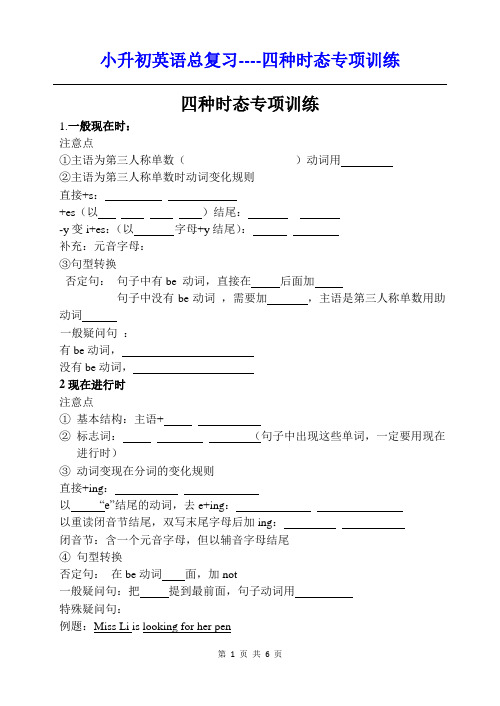
四种时态专项训练1.一般现在时:注意点①主语为第三人称单数()动词用②主语为第三人称单数时动词变化规则直接+s:+es(以)结尾:-y变i+es:(以字母+y结尾):补充:元音字母:③句型转换否定句:句子中有be 动词,直接在后面加句子中没有be动词,需要加,主语是第三人称单数用助动词一般疑问句:有be动词,没有be动词,2现在进行时注意点①基本结构:主语+②标志词:(句子中出现这些单词,一定要用现在进行时)③动词变现在分词的变化规则直接+ing:以“e”结尾的动词,去e+ing:以重读闭音节结尾,双写末尾字母后加ing:闭音节:含一个元音字母,但以辅音字母结尾④句型转换否定句:在be动词面,加not一般疑问句:把提到最前面,句子动词用特殊疑问句:例题:Miss Li is looking for her pen①②对①进行提问:对②进行提问:3一般过去时:注意点④句型转换否定句:主语+ (没有be动词)主语+ (有be动词)一般疑问句:以开头(没有be动词)以开头(有be动词)特殊疑问句:特殊疑问词+ + + ?(没有be动词)例题翻译:你家过去在哪里?4,一般将来时注意点①基本结构:主语+②标志词:next+年,月,日③句型转换:否定句:在be动词面加not他下周打算去公园吗?(一般疑问句)他下周打算去哪里?(特殊疑问句)④翻译:下周它将会是:_________ did you ________ the birds?2. Then, he let the boy go.(改为否定句)Then,he _______ ________ the boy go.3. They could play football.(改为一般疑问句,并作肯定回答)----________ they play football? ----Yes, they _________.4. Nancy lives in Nanjing now.(用last year 改写句子)Nancy _______ in Nanjing last year.5.I went to a shopping centre last Sunday.(改为一般疑问句,并作否定回答)---______ you ______ to a shopping centre last Sunday? ---No, I _________.6. He puts his things in order. (改为一般疑问句)___________________________________________________7. Did you go to bed late last night? (改为陈述句)____________________________________________________8. They often do their homework in the evening. (用she替换they)____________________________________________________9. You should put your books and toys on the floor. (改为否定句)_____________________________________________________10. He feels sleepy in the morning. (对划线部分提问)____________________________________________________11. This is Bobby’s bedroom. (对划线部分提问)____________________________________________________12. have, my, time, breakfast, I, always, on (.) (连词成句)____________________________________________________.13. The, out, the, get, lion, mouse, helped (.) (连词成句)____________________________________________________. 14. A monkey woke the tiger up.(改成一般疑问句)__________________________________________________15. Sam brings some water.(改成否定句)__________________________________________________16. Mike has some bread and milk for breakfast. (对划线部分提问)__________________________________________________17. The man sings well. (对划线部分提问)18. too, you, cola, much, drink, shouldn’t (.) (连词成句)______________________________________________________20 The children must play football on the road.(改为否定句)______________________________________________________ 21. We must look out for the traffic lights first.(对划线部分提问)______________________________________________________ 22. An old woman is crossing the road.(对划线部分提问)______________________________________________________ 23. You can’t watch TV now because it’s late. (对划线部分提问)______________________________________________________ 24. keep, desk, tidy, I, must, my, clean, and (.)(连词成句)______________________________________________________二用所给词的适当形式填空1.Let (we )(play) basketball this afternoon.2. (Be)your sister (visit) your parents tomorrow?3.Yang Ling is going to (make) clothes for her dolls.4. (child) Day is on the first of June.5. Tim usually (brush) his teeth in the morning.6.I (have) a birthday party last year.7.Tomorrow is Dragon Boat Festival. We (watch )a dragon boat race.8. They (eat) moon cakes last Mid-Autumn Festival?9.My parents ( watch) TV in the living room now.10. Your birthdayis coming. I (make) a cake for you.11.Let’s(play) the piano together.12.How many ( visit) are there in your group?13.My sister wants ( learn) about in England.14.My uncle is from ( Chinese).15.Animal ( love) will go to see them quickly.16.Jack (go )and look for his parents next week.17. (visit) from the US are very friendly.18.The girls ( learn) an English song next week.19.The students are very (excite).Because the game is very (e xcite).20.My mother likes ( listen)to music after dinner.21.He ( read) a book last night.22.Lucy is going to ( find) a book about e- cards.23.I (eat) some bread for breakfast yesterday.24.Can I ( have) an English book?25.We (are) twelve years old last year.26.I want (buy )a computer.27.What ( be) your parents going to do this weekend?28.We (fly) kites tomorrow.29.The boy ( come) to my house the day after tomorrow.30.What about (go )for a picnic next week?31. Mary’s birthday is next Monday, her mother (give) her a present.32.My mother ( buy) some snacks and drinks this morning.33. (Be) your family going to climb the hill next Sunday?34.Now, Bobby ( wear) his new clothes.35.This lesson (end) at half past eleven. Then you can have lunch.35. It is very cold these days . It (snow) tomorrow.36.-- You ( come here again next Saturday?---No. I (visit) my teacher.37.Hurry up! or we (be )late.38.--What you ( do) tomorrow afternoon?--I (see )a film with my friend.39.---Can you come and ( help )me with my English ,mum?。
小学四种时态试题及答案

小学四种时态试题及答案一、一般现在时1. 我每天上学。
A. go to schoolB. goes to schoolC. am going to schoolD. am going to go to school答案:A2. 他经常帮助别人。
A. He often help others.B. He often helps others.C. He often helped others.D. He often helping others.答案:B3. 我们喜欢游泳。
A. We like to swim.B. We likes to swim.C. We liked to swim.D. We liking to swim.答案:A二、一般过去时4. 昨天我去了图书馆。
A. I go to the library yesterday.B. I went to the library yesterday.C. I am going to the library yesterday.D. I go to the library yesterday.答案:B5. 他们上周看了电影。
A. They watch a movie last week.B. They watched a movie last week.C. They are watching a movie last week.D. They will watch a movie last week.答案:B6. 她昨天买了一本书。
A. She buy a book yesterday.B. She bought a book yesterday.C. She is buying a book yesterday.D. She will buy a book yesterday.答案:B三、一般将来时7. 明天我要去看医生。
A. I am going to see a doctor tomorrow.B. I go to see a doctor tomorrow.C. I went to see a doctor tomorrow.D. I will go to see a doctor tomorrow.答案:A8. 他们将要参加比赛。
(完整版)小学英语四大时态总结及练习题

你知道时态是什么意思吗?时态代表什么吗?小学英语就四个时态,你掌握了吗?你能发现它们之间的共同点和不同点吗?勤加练习,百战不殆I.把下列动词变为第三人称单数形式。
1. clean--2. go--3. have--4. do-5.play--6. fly--7. come-- brush-9. watch-- 10. study-- 11. ask-- 12.answer--13. swim-- 14. catch-- 15. write--16. eat-- 17. make-- 18. paint—19. learn-- 20. phone-- 21. run—22. hop-- 23. sing-- 24. pick—II.把下列动词变成过去式is\am________ fly______ plant_____ are________ drink_________play_______ go________ make ______ do_________dance________ worry_____ask _____ taste_________ eat________draw________ put ______ throw________ kick_________pass_______ do ________III.把下列动词变成动名词形式。
wake________ make__________ come____________ have____________take_________ leave__________ rid_________, regret__________,begin________ cut________, get_________, hit_________, run_________, set_________, sit__________, spit__________, stop_________, swim________, beg_________, drop__________, fit_________, nod_________, dig___________, forget_________, travel_________ visit_________ carry_________ enjoy___________ play ___________ study _____die_________ lie_________多加练习,百战不殆之时态篇一、用单词的正确形式填空:1.Mike _________ (do) his homework every day.2.There __________(be) some water in the glass.3.We like ________ (play) basketball after class.4.I like singing. I often _________(listen) to the music in the evening.5.My grandma_________(watch) TV every day.三、选择最佳的答案:1. ____Alice often play the piano? No, she _____. A. Do; do B. Does; does C. Does; doesn't2. ___ your penpal __ in Beijing? A. Do; live B. Do; lives C. Does; live3. Tom and Mike __ very excited, they will take a trip. A. is B. are C. am4. I like ________ very much. What about you? A. dance B. danced C. dancing5. The kite ____ a bird. A. look like B. is looking C. looks like6. Bill and I ___ good friends. A. is B. are C. am7. Sandy often ___ his homework on Sundays . A. do B. does C. did8. What do you usually do on the weekend? I __________.A. went swimmingB. go swimmingC. visited grandparents9. What do you usually do on your holiday? I usually __________.A. saw elephantsB. sing and danceC.took picture10. I ____ a student. I go to school ____bus every day. A. is; by B. am; on C. am; by11. I ____ a brother. She ____ a sister. A. have; has B. has; has C. have; have12. You ____ a student. He ____ a teacher. A. is; is B. are; is C. are; are13. He always _____ football games. A. watches B. watch C. doesn't14. My best friend _____ shells. A. collects B. collect C. often15. She doesn’t _____ listening to the music. A. often B. like C. likes16. My mother and I ___ always watch romantic films. A. doesn’t B. don’t C. do17. ---When _____ he get home on Friday?----He gets home at four on Friday. A. do B. does C. did18.Summer _________ spring.A. comes afterB. comes ines before二、用单词的适当形式填空:1. look! Chen Jie and Mike are ___________(sing)now.2. The small bear is _____________ (climb) the tree.3. Mike is ________________ (draw) picture.4. She is ________________ (do) the dishes.5. My brother __________ (make) kites now.6. My father is ___________ (read) a newspaper in living room.7. Ted is __________(answer) the phone.8. My uncle is ____________ (drive) a car.9. The students are ______________(listen) to their teacher carefully.10. Chen Jie is _________(wash) clothes.11. His sister _______ (be) writing an e-mail.12. We ______(be) cleaning the classroom now.13. I____ (be)working on my computer.14. They _____ (be)playing basketball.15. Look, The tiger ________ __________(walk).16. Look, The elephants ______ _____________(drink) water with their trunk.17. Look, The monkeys ________ ___________ (swing).18. Peter _________ ______________(take) pictures now.19. They _____ ________(take)up the apples now.20. We _______ ________(catch) butterflies now.三、选择正确答案1. Every one ____ to their teacher in the classroom. A. are listening B. is listening C. listen2. They are singing and ___ together at the party now. A. dance B. danced C. dancing3. Listen! The birds ____. A. is singing B. are sing C. are singing4. Look! The kite ___ in the sky. A. fly B. flies C. is flying5. They ____ riding a forse. A. is B. are C. am6. Kate ____ playing chess. A. am B. is C. are7. Are you washing clothes? A. Yes, you are B. Yes, I am C. No, I am8. Is he ____ TV?Yes, he is. A. watch B. watching C. not9. ____ they taking pictures.? Yes, they are. A. Am B. Be C. Are10. It’s 10 o’clock. Ben _____ TV in the bedroom. A. watch B. is watching C. watches五、根据中文填空。
四个基本时态-句型转换精讲及练习-适合小升初
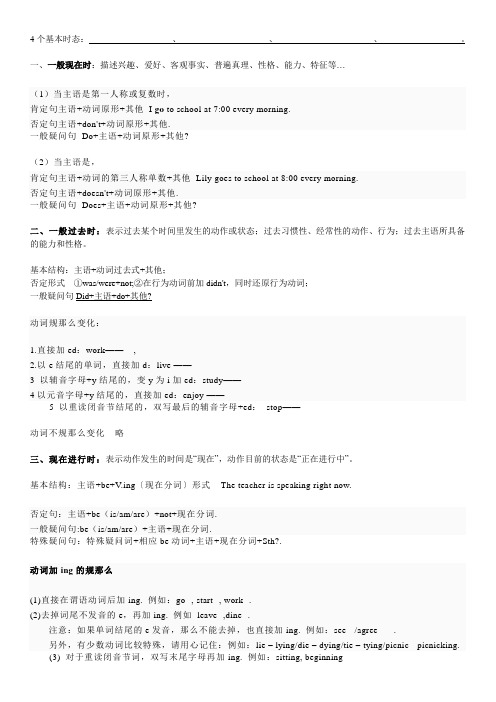
4个基本时态:、、、。
一、一般现在时:描述兴趣、爱好、客观事实、普遍真理、性格、能力、特征等…(1)当主语是第一人称或复数时,肯定句主语+动词原形+其他I go to school at 7:00 every morning.否定句主语+don't+动词原形+其他.一般疑问句Do+主语+动词原形+其他?(2)当主语是,肯定句主语+动词的第三人称单数+其他Lily goes to school at 8:00 every morning.否定句主语+doesn't+动词原形+其他.一般疑问句Does+主语+动词原形+其他?二、一般过去时:表示过去某个时间里发生的动作或状态;过去习惯性、经常性的动作、行为;过去主语所具备的能力和性格。
基本结构:主语+动词过去式+其他;否定形式①was/were+not;②在行为动词前加didn't,同时还原行为动词;一般疑问句Did+主语+do+其他?动词规那么变化:1.直接加ed:work——,2.以e结尾的单词,直接加d:live ——3 以辅音字母+y结尾的,变y为i加ed:study——4以元音字母+y结尾的,直接加ed:enjoy ——5 以重读闭音节结尾的,双写最后的辅音字母+ed:stop——动词不规那么变化---略三、现在进行时:表示动作发生的时间是“现在”,动作目前的状态是“正在进行中”。
基本结构:主语+be+V.ing〔现在分词〕形式The teacher is speaking right now.否定句:主语+be(is/am/are)+not+现在分词.一般疑问句:be(is/am/are)+主语+现在分词.特殊疑问句:特殊疑问词+相应be动词+主语+现在分词+Sth?.动词加ing的规那么(1)直接在谓语动词后加ing. 例如:go- , start- , work- .(2)去掉词尾不发音的e,再加ing. 例如leave- ,dine- .注意:如果单词结尾的e发音,那么不能去掉,也直接加ing. 例如:see - /agree - .另外,有少数动词比较特殊,请用心记住:例如:lie – lying/die – dying/tie – tying/picnic - picnicking.(3) 对于重读闭音节词,双写末尾字母再加ing. 例如:sitting, beginning四、一般将来时:表示将来某一时刻的动作或状态,或将来某一段时间内经常的动作或状态。
小升初英语各大时态练习题

单击此处添加副标题内容
汇报人:XX
目录
CONTENTS
01 单击此处添加文本 02 一般现在时态 03 现在进行时态 04 一般过去时态 05 一般将来时态
xx
PART ONE
添加章节标题
xx
PART TWO
一般现在时态
定义与用法
单击此处添加标题
定义:一般现在时态表示经常发生的动作或存在的状态
练习题
写出下列句子中的现在分词形式:I am writing a letter.
写出下列句子中的否定形式:We are studying English.
添加标题
添加标题
将下列句子改为一般疑问句:He is playing the guitar.
添加标题
添加标题
将下列句子改为现在进行时的否定 句:They are running in the park.
定义与用法
定义:表示现在或现阶段正在 进行或发生的动作或状态
用法:常与now、right now、 at the moment等时间状语连 用,表示正在进行的动作
结构:be动词+动词ing形式, 例如“I am studying English right now”
注意事项:与一般现在时态的 区别和易混淆点
选择正确形式填空:He _______ (not) like bananas.
用括号中所给单词的适当形式填 空:I _______ (go) to school every day.
根据句子意思及所给提示,写 出正确的单词形式:What _______ (do) your father do?
答案解析
答案解析
小学英语小升初复习时态四大时态的综合、导图及训练 动词时态练习及答案
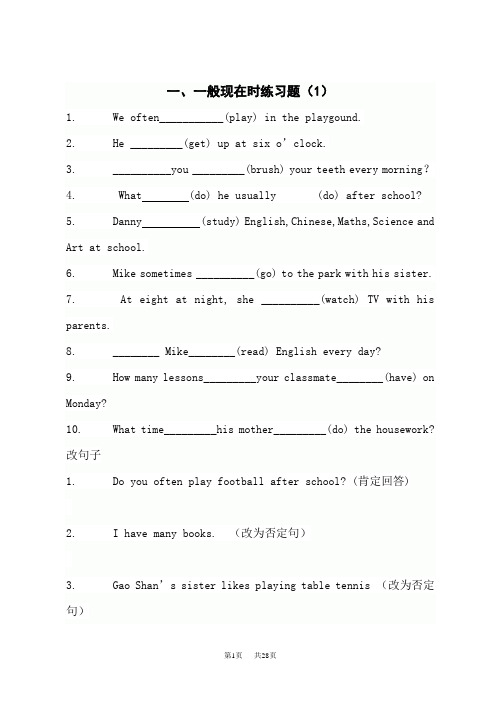
一、一般现在时练习题(1)1. We often___________(play) in the playgound.2. He _________(get) up at six o’clock.3. __________you _________(brush) your teeth every morning?4. What (do) he usually (do) after school?5. Danny (study) English,Chinese,Maths,Science and Art at school.6. Mike sometimes __________(go) to the park with his sister.7. At eight at night, she __________(watch) TV with his parents.8. ________ Mike________(read) English every day?9. How many lessons_________your classmate________(have) on Monday?10. What time_________his mother_________(do) the housework? 改句子1. Do you often play football after school? (肯定回答)2. I have many books. (改为否定句)3. Gao Sha n’s sister likes playing table tennis (改为否定句)4. She lives in a small town near New York. (改为一般疑问句)5. I watch TV every day. (改为一般疑问句)6. David has a goal. (改为一般疑问句)7. We have four lessons.(否定句)8. Nancy doesn’t run fast (肯定句)9. My dog runs fast.否定句:一般疑问句:10. Mike has two letters for him.一般疑问句:否定句:11. I usually play football on Friday afternoon.一般疑问句:否定句:一般现在时练习(2)1. He often (have) dinner at home.2. Daniel and Tommy (be) in Class One.3. We (not watch) TV on Monday.4. Nick (not go) to the zoo on Sunday.5. they (like) the World Cup?6. What they often (do) on Saturdays?7. your parents (read) newspapers every day?8. The girl (teach) us English on Sundays.9. She and I (take) a walk together every evening.10. There (be) some water in the bottle.二、现在进行时练习1、I _______________________( look for) a shirt, I’m looking fora tie.2、They ______________________( plant) flowers in the yard now.3、Miss Baker _________________( drink) milk in the cafeteria now.4、What are you _________(do) now? I ___________(eat) bread.5、It’s nine o’clock. My father_______________(work) in the office.6、Look, the boy____________(put) the rubbish into the bin.7、__________he__________(clean) the classroom? No, he isn’t. He____________(play).8、Where is Mak? He___________(run) on the grass.9、Listen, who____________(sing) in the music room? Oh, Mary_____________(sing) there.10、Who_______(sing)a song? ----Li Ying is.现在进行时练习(2)1、写出下例动词的现在分词形式1)give____ 2)use____ 3)clean____ 4)skate____ 5)draw____ 6)tell____ 7)do____ 8)write____ 9)get____ 10)put____ 11)take____ 12)stop____ 13)speak____ 14)swim____ 15)come____ 16)lie____ 17)die____ 18)cook____ 19)fly____ 20)help____ 21)close____ 22)see____ 23)run____2、用现在进行时连写句子1)Li Ping;learn;to;speak;English;____________________________________________________________it;rain;now____________________________________________________________3)they;watch;a football match;on TV____________________________________________________________he;look;out of the window;____________________________________________________________look;the dog;sleep;____________________________________________________________listen;the boy;talk;____________________________________________________________ they;have lunch;at seven o'clock____________________________________________________________ the students;write;homework;now;____________________________________________________________ 3、将下例句子改成一般疑问句1)Mike is climbing the hill。
四种时态练习和答案

四种时态练习和答案一般现在时基本知识一:一般现在时:表示经常性的事情。
时间状语:often经常, usually通常, always总是, every每个, sometimes有时,at…在几点钟只有第三人称单数用动词三单,其余动词均用原形三单变化:多数在动词后加s play—plays like—likes 以s,x,sh,ch,o结尾的动词加es go—goes wash--washes 以辅音字母加y结尾,把y改i再加es fly—flies二:基本结构:动词原形(如主语为第三人称单数,动词上要改为第三人称单数形式)三:否定形式:am/is/are+not;此时态的谓语动词若为行为动词,则在其前加don't,如主语为第三人称单数,则用doesn't,同时还原行为动词。
四:一般疑问句:把be动词放于句首;用助动词do提问,如主语为第三人称单数,则用does,同时,还原行为动词。
五:但是,动词to be 和to have 的一般现在时的形式特殊如下:一般动词的词形变化 To be 的词形变化 T o have 的词形变化I know it I am a student I have a pen.You know it. You are a student You have a penHe (she) knows it. He (she) is a student. He (she)has a pen.We (you,they) know it. We (you,they) are students. We (you,they) have pens.六:习题及部分答案一、写出下列动词的第三人称单数talk______forget______hope______stop______perform______play______ say______buy______worry______fly______study_______like_______make______ take______love_______recite_______become_______come_______drive______ _ shine_______leave_____wake_______ride_______write_______hike______give_ _____see______swim______stop______shop_______plan______get______ _ sit_______let_______cut_______run_______forget_______begin_______wash_____watc h_______finish______teach_____fish_______reach_______go_______do___ __二、用括号内动词的适当形式填空。
小学英语小升初《四大时态》专项练习和答案(分别编排)

小升初英语四大时态专项练习班级考号姓名总分一、一般现在时一、写出下列动词的第三人称单数形式。
eat read do take washwatch have carry study f lycatch go have cook looksing teach like get come play二、用单词的正确形式填空:1. Mike ___________ (do) his homework every day.2. There ____________ (be) some water in the glass.3. We like ____________ (play) basketball after class.4. I like singing. I often ____________ (listen) to the music in the evening.5. My grandma ___________ (watch) TV every day.三、选择最佳的答案:1. ____Alice often play the piano. No, she _____.A. Do; doB. Does; doesC. Does; doesn\\\\'t2. ___ your penfriend __ in Beijing?A. Do; liveB. Do; livesC. Does; live3. Tom and Mike __ very excited, they will take a trip.A. isB. areC. am4. I like ________ very much. What about you?A. danceB. dancedC. dancing5. I can’t find my pen. Let me __.A. go and ask herB. go and ask hersC. go and ask she6. Fangfang is a good student. She ____maths.A. does good atB. well do itC. is good at7. The kite ____ a bird. A. look like B. is looking C. looks like8. Bill and I ___ good friends.A. isB. areC. am9. Sandy often ___ his homework on Sundays .A. doB. doesC. did10. What do you usually do on the weekend? I __________.A. went swimmingB. go swimmingC. visited grandparents11. What do you usually do on your holiday?A. saw elephantsB. sing and danceC.took picture12. I ____ a student. I go to school ____bus every day.A. is; byB. am; onC. am; by13. I ____ a brother. She ____ a sister.A. have; hasB. has; hasC. have; have14. You ____ a student. He ____ a teacher.A. is; isB. are; isC. are; are15. He always _____ football games.A. watchesB. watchC. doesn\\\\'t16. My best friend _____ shells.A. collectsB. collectC. often17. She doesn’t _____ listening to the music.A. oftenB. likeC. likes18. My mother and I ___ always watch romantic films.A. doesn’tB. don’tC. do19. ---When _____ he get home on Friday?----He gets home at four on Friday.A. doB. doesC. did二、现在进行时一、写出下列单词的现在分词:do play dance sitmake swim jump cookclean watch come readeat write sing gorun fly catch help二、用单词的适当形式填空:1. look! Chen Jie and Mike are ___________(sing)now.2. The small bear is ________ (climb) the tree.3. Mike is ________ (draw) picture.4. She is ________ (do) the dishes.5. My brother is ________ (make) kites.6. My father is ________ (read) a newspaper in living room.7. Ted is __________(answer) the phone.8. My uncle is ________ (drive) a car.9. The students are ________(listen) to their teacher carefully.10. Chen Jie is _________(wash) clothes.三、选择正确答案1. Every one ____ to their teacher in the classroom.A. are listeningB. is listeningC. listen2. They are singing and ___ together at the party now.A. danceB. dancedC. dancing3. Listen! The birds ____.A. is singingB. are singC. are singing4. Look! The kite ___ in the sky. A. fly B. flies C. is flying5. They ____ riding a forse. A. is B. are C. am6. Kate ____ playing chess. A. am B. is C. are7. Are you washing clothes?A. Yes, you areB. Yes, I amC. No, I am8. Is he ____ TV?Yes, he is. A. watch B. watching C. not9. ____ they taking pictures.? Yes, they are.A. AmB. BeC. Are10. It’s 10 o’clock. Ben _____ TV in the bedroom.A. watchB. is watchingC. watches四、根据中文填空。
小学英语四大时态总结(附小升初时态考题)

4. 以o结尾的单词: 有生命加s 。
tomato-tomatoespotato-potatoes无生命加espiano-pianosphoto-photoszoo-zoosradio-radios小升初时态专题综合训练1.(成都市青羊区小学毕业卷)John _____ football.A. likes playingB. likes playC. like play2.(深圳市龙岗区小学毕业卷)Does your mother _____ football?A. likeB. likesC. like play3.(芜湖市第三中学招生卷)They usually _____ TV in the evening.A. watchB. will watchC. are watchingD. watches4.(上海市奉贤区小学毕业卷)—What do you usually do on the weekend?—I often ____.A. do my homeworkB. did my homeworkC. doing my homework5. (杭州市西湖区小学毕业卷)I don’t like _____ thril lers(恐怖片)______ playing baseball.A. watching; orB. watching; andC. to watch; or6.(菏泽市晨曦中学招生卷)Bob often _____ to school.A. walkB. walksC. walked7.(南昌铁路一中初中部招生卷)My pen ______ on my desk ten minutes ago.But it _____ there now.A. is; isn’tB. was; isn’tC. is; is8.(长沙市宁乡县小学毕业卷)Mike is _____ after his classmates.A. runsB. runingC. running9.(桂林市奎光学校招生卷)Be quiet! The babies ________.A. sleepB. are sleepingC. slept10. (武汉市青山区小学毕业卷)______ he _____ his homework yesterday?A. Does; doB. Did; didC. Did; do11(北京市朝阳区小学毕业卷)—What did you do last weekend?—I ______.A. go swimmingB. did my homeworkC. went swim12.(芜湖市第十一中学招生卷)—What’s your hobby?—_____ is my hobby.A. Collecting stampsB. Collect stampsC. Stamps13.(广州市白云区小学毕业卷)—Where were you just now?—I _____ at school.A. isB. wasC. were14.(武汉市青山区小学毕业卷)______ he ______ his grandparents lastmonth?A. Did; visitedB. Did; visitC. Do; visited15.(郑州市二七区小学毕业卷)Last week, we _____ a _____ race.A. hard; runningB. have; runningC. had; running16.(福州市仓山区小学毕业卷)I______ to the park last week.A. goB. wentC. going17.(合肥市蜀山区小学毕业卷)If I _____ you tomorrow, I will give youthe receipt(收据)。
word完整版小升初四大时态及习题

英语四大时态总复习般现在时般现在时的形式以及定义般现在时的基本用法1.表示事物的性质、特征以及经常性的行为,常与always, often. usually, every day 等词连用。
Tom usually comes to school late. Tom 经常上学迟至叽2.表示客观事实和普遍真理。
The sun rises in the east. 太阳从东方升起。
3.用在格言、谚语中。
No pains, no gains. 不劳而获。
般过去时般过去时的定义以及形式般过去时的基本用法1.表示在过去的时间里发生的动作或存在的状态,常与yesterday, last ni ght, several years ago 等连用。
I took a bus to school last Friday. 上周五我坐公交车去上学。
2.表示在过去的某段时间里,经常或反复发生的动作或状态。
他们去年经常晚饭They had a walk after supper last year.后散步。
般将来时般将来时的定语以及形式表示将来某一时刻的动作或状态,或将来某一时间内经常发生的动作或状态。
Shall/ will+动词原形Be goi ng to + 动词原形We shall go sho pping tomorrow. 我们打算明天去购物。
I'm going to see the film tomorrow. 我明天去看电影。
般将来时的基本用法1.表示将来某个时间要发生的动作或状态,常与将来的时间状语tomorrow, n ext week 等连用。
She will be back tomorrow. 她明天就回来。
2.表示将来某一时间内经常发生的动作或状态。
We ' have a test every Mo nday this year. 今年的每一个周一我们都有考试。
巧学妙计Be going to指当前已计划过或思考过的意图和打算;will/ shall表示未事先思考或未计划的意图。
小升初语法易错动词四大时态(专项训练)人教PEP版英语六年级下册

六年级英语小升初语法易错动词四大时态综合训练卷班级: 姓名: 得分:一、基础训练1.[基础]按要求写出下列单词的正确形式。
(1) is(过去式) (9) do(三单)(2) like(三单) (10) swim(现在分词)(3) study(过去式) (11) play(过去式)(4) see(现在分词) (12) can(过去式)(5) think(过去式) (13) go(过去式)(6) buy(过去式) (14) dish(三单)(7) wash(三单) (15) have(现在分词)(8) run(三单)2.[be动词]用be动词的正确形式填空。
(1)I from China, But my friends, Lily and Lucy, from America.(2) It sunny today, but it was rainy yesterday. Tomorrow, it will snowy(3) My parents young twenty years ago. Now, they old. But I love them.(4)I active now. But three years ago, I very shy.(5)I want to a teacher, because my parents both teachers.(6)—— Jack from Beijing? ——No, he3.[助动词、情态动词]用do或will 的正确形式填空。
(1) What your brother do at weekends?——He plays basketball with his friends.(2) What you do last Sunday? ——I visited the Great Wall(3) When you go to London? ——Tomorrow morning.(4) you your homework yesterday? ——Yes, I(5) you go to the cinema with me next Sunday?——No, I4.[应用]用所给词的适当形式填空。
小升初四种时态习题.(优选)

一般过去时用法:①过去发生的动作;②过去存在的状态。
一般过去时中,动词过去式的构成规则1. 一般情况下,直接加ed。
如:visit---visited2. 以不发音的e结尾,加d。
如:live---lived3. 以辅音字母+y结尾,把y改成i,加ed。
如:study---studied4. 以元音字母+y结尾,直接加ed。
如:play---played5. 重读闭音节结尾的词,双写末尾字母加ed。
如:stop---stopped6. 不规则变化,如:go---went否定句:主语+didn’t+动词原形+其他主语+wasn’t/weren’t+其他如:I didn’t go to the park yesterday.They weren’t free yesterday.一般疑问句:Did+主语+动词原形+其他Was/Were+主语+其他如:Did you go to the park yesterday?Yes,I did./No,I didn’t.Were they free yesterd ay?Yes,they were./No,they weren’t.特殊疑问句:疑问词+一般疑问句如:What did you see in the zoo?Who were at home last night?常用时间状语: yesterday,three months ago,last week/year,in 1990例句:He always went to work by bus last year.Han Meimei was in the classroom a moment ago.When did you meet him?轻松试一下一.写出下列不规则动词的过去式。
am,is keep are let become make begin meet bite put blow read buy cost catch run come say ride see cut sing dig sitdo sleep draw speak drink sweep eat take fall teach feed tell feel think fly throw forget understand get givewake go wear knowwin have/has write grow二.用动词的适当形式填空。
小升初四大时态题目+答案

小升初四大时态易错专项练习+对应答案一般现在时易错练习A.句中有with时,尤其放在主语后面,谓语动词只看主语B. what,who做句子的主语时,要将其看成第三人称单数C.根据回答判断时态,若回答是does/do,时态一般现在时D.若句子是事实真理,用一般现在时E.与祈使句区别开来,学会not be的用法1. Tom with his friends ____(fly) kites over there every morning.2. Mary with her brother _(fly) kites in the park every weekend.3. Millie,_____(not) be afraid of snakes.4. Millie __(not be) afraid of snakes.5. The teacher said that the light _____(travel) faster than the sound.6._ Tommy with his parents _(shop) on Sundays?7. My uncle with his children __(fly) kites on Sunday mornings.8. Mike,with his family members,__(water) the flowers in the garden now.9. It's7o'clock. David ___(brush) his teeth10. Who __ send) you to school every day?11. What ___(make) our city clean and tidy?12. We knew that the sun ______(rise) from the east.13.---__ she __(walk) to school?---No,she doesn't14. My father always _____(wear) black cothes.15. Millie,___(not read) in the sun. It's bad for your eyes.16. Look!Everyone in the classroom __(have)a book in their hands.17. Tom,_(not be) late for school again.18. You are wrong. My classmate Lucy and I____(not be) in the reading club.19. He _____(not be) good at sports.20. Who often _____(help) you with your Maths?一般过去时易错练习1.---Who _(speak) at the meeting on Friday!---Millie did.2. she _(buy)a book the day before yesterday.3. David ___(put) the books in the bag and left the classroom.4. She ____(think) that she was late for school.5._ Tom __(ride) to school yesterday?6. Who ______(teach) you English last year?7. My parents ____(buy) me a new bike as my birthday present last week.8. Who ______(teach) you to ride a bike when you were a child?9. Millie _(not do) homework yesterday.10. My father read a book in the room,and I____(do) my homework in the study.11. At last,I_____(come) home at 10:00 PM.12. My father ____(take) this photo in Japan about two years ago.13. Tom __(not write)a letter to his parents yesterday evening.14. My cousin ___(put) up a tent near a lake 10 minutes ago.15. Lucy _(go) to the City Museum last Sunday.16. My friend,Carol,___(study) for the math test last night.17. She ____(stay) at home and __(do) some cleaning after she came back from work.18. She _(not visit) her aunt last weekend.19.____ she ___(practice) her guitar yesterday?20.I__(have) an exciting party last weekend.一般将来时易错练习A. there be的一般将来时:there will be/there is are/going to be;注意不能出现have一词B. in+一段时间:in 3 hours;in 2 days等用将来时C.根据回答来使用will或者be going toD. if表达如果,主将从现1. My father _(go) to Shanghai next week,won't he?2. She ______(come) back to HK in 3 days.3.____ Lily _(play) with her friends tomorrow? No,she isn't.4.__ there _(be) two football matches in two weeks,aren't there?5.--Who __(teach) you maths?----Mr Wang will.6. The members of Running Man _(arrive) at the airport in half an hour.7. There _____(be)a football match tomorrow.8.---__ there ___(be)a football match tomorrow?----Yes,there will.9. My father ___(go) to Shanghai next week.10._ we meet at the school gate tomorrow?11. We'll go to the park if it _ rain tomorrow.A. don'tB. doesn'tC. won'tD. isn't12.—If my uncle ____ next weekend,we __with him.—Sounds great!A. will come;will go skiingB. will come;goes skiingC. comes;will go skiingD. comes;goes ski13.―What will you do if it _ tomorrow?14.—I will stay at home and watch the match on TV.A. rainB. rainsC. will rainD. is raining15.I'm sorry I'm very busy now.IfI___ time,I___ come to see you.A. have,wouldB. had,willC. were,willD. have,will16. James with the Greens _the White Tower Park if it __ tomorrow.A. are going to;isn't rainyB. are going to;doesn't rainC. is going to;won't rainD. is going to;isn't rainy17.--There ____a bird show this afternoon. Shall we go to the zoo to watch it?---Good idea.A. will haveB. is going to haveC. will beD. is going to18.---Will there __avolleyballmatch on Sunday?---Yes. There __ twovolleyballmatches on that day.A. be;are going to beB. have;are going to beC. have;are going to haveD. be;are going to have19. There ____ helping hands”meeting this Sunday morning.A. is;atB. will be;atC. is going to be;/D. is going to have;on20.---There __a parents'meeting on Tuesday afternoon,isn't there?---Yes. But my parents don't have time for it.A. will haveB. will beC. is going to haveD. is going to be现在进行时易错练习A. have作为有的意思来讲时,没有进行时。
- 1、下载文档前请自行甄别文档内容的完整性,平台不提供额外的编辑、内容补充、找答案等附加服务。
- 2、"仅部分预览"的文档,不可在线预览部分如存在完整性等问题,可反馈申请退款(可完整预览的文档不适用该条件!)。
- 3、如文档侵犯您的权益,请联系客服反馈,我们会尽快为您处理(人工客服工作时间:9:00-18:30)。
英语四大时态总复习一般现在时一、一般现在时的形式以及定义二、一般现在时的基本用法1. 表示事物的性质、特征以及经常性的行为,常与always, often, usually, every day等词连用。
Tom usually comes to school late. Tom 经常上学迟到。
2. 表示客观事实和普遍真理。
The sun rises in the east. 太阳从东方升起。
3. 用在格言、谚语中。
No pains, no gains.不劳而获。
一般过去时一、一般过去时的定义以及形式二、一般过去时的基本用法1. 表示在过去的时间里发生的动作或存在的状态,常与yesterday, last night, several years ago等连用。
I took a bus to school last Friday.上周五我坐公交车去上学。
2. 表示在过去的某段时间里,经常或反复发生的动作或状态。
They had a walk after supper last year. 他们去年经常晚饭后散步。
一般将来时一、一般将来时的定语以及形式二、一般将来时的基本用法1. 表示将来某个时间要发生的动作或状态,常与将来的时间状语tomorrow, next week等连用。
She will be back tomorrow.她明天就回来。
2. 表示将来某一时间内经常发生的动作或状态。
We’ll have a test every Monday this year. 今年的每一个周一我们都有考试。
巧学妙计Be going to 指当前已计划过或思考过的意图和打算;will/ shall 表示未事先思考或未计划的意图。
Be going to 还可以表明马上要发生,而will则表明说话者的观点、主观意识。
I’m going to visit mu aunt this week. 我打算这周去看望姑姑。
(事先经过思考)I’ll open the door. 我去开门。
(未经事先考虑)现在进行时一、现在进行时的定义以及形式二、现在进行时的基本用法1.表示此时此刻正在发生或进行的动作,常与now, today连用。
It’s raining hard now.正在下大雨。
2.表示现在一段时间内进行的动作,常与this month, this week等连用。
The farmers are working hard these days. 这些天农民工们工作很忙。
3.现在进行时可表将来的动作。
They’re seeing me next week. 他们下周来看我。
巧学妙计See, come, go, leave, start, begin 等词可用现在进行时表示表将来的意义。
不规则的动词过去式。
(1)不变cut(剪)hurt(受伤)hit(打)let(让)put(放)read(读)(2)改i为o drive-drove(开车)ride-rode(骑)rise-rose(升起)write-wrote (写)win-won(赢)(3)该i为a begin-began(开始)drink-drank(喝)sit-sat(坐)give-gave(给)sing-sang(唱歌)swim-swam(游泳)(4)改为aught catch-caught(抓住)teach-taught(教)(5)改为ought buy-bought(买)bring-brought(带来)think-thought(思考)(6)改eep为ept sleep-slept(睡觉)sweep-swept(打扫)keep-kept(保持)(7)改a/ow为ew blow-blew(吹)know-knew (知道)throw-threw(扔)draw-drew(画画)(8)其它形式am/is-was(是)are-were(是)come-came(来)do-did(做)eat-ate(吃)fall-fell(落下)find-found(找到)feel-felt(感觉)get-got(得到)forget-forgot(忘记)go-went(去)have-had(有)hear-heard(听)lose-lost(丢失)meet-met(见面)make-made(制造)run-ran(跑步)say-said(说)see-saw(看见)sell-sold(卖)send-sent(寄)speak-spoke(讲)take-took(带走)tell-told(告诉)wake-woke(醒)六年级英语复习资料(一)——句式变换一、把一般现在时改为过去时。
(1)①I am a student.(改be动词) am/ is/ are——was/were______________________________________________________________________②He is a doctor.______________________________________________________________________③She is a teacher.______________________________________________________________________④They are my friends.______________________________________________________________________(2)①Tom goes to school by bike.(改动词)______________________________________________________________________②I like mangoes.______________________________________________________________________③They play basketball.______________________________________________________________________二、把一般现在时改为现在进行时。
(现在进行时:be+Ving)1)I go to the park._____________________________________________________________________2)They listen to the radio._____________________________________________________________________3)She does her homework._____________________________________________________________________三、把一般现在时改为一般将来时。
(将来时:be going to/will+V原)1)I go to the park._____________________________________________________________________2)They watch TV every day._____________________________________________________________________3)Jenny sings a song ._____________________________________________________________________四.按要求改写成相对应的时态。
1)I buy a can of cola.①____________________________________________(一般过去时)②____________________________________________(现在进行时)③____________________________________________(一般将来时) 2)She washed face yesterday.①____________________________________________(一般现在时)②____________________________________________(现在进行时)③____________________________________________(一般将来时)3)They are visiting their relatives.①____________________________________________(一般现在时)②____________________________________________(现在过去时)③____________________________________________(一般将来时) 4)Tom and Ben are going to go to Beijing.①____________________________________________(一般现在时)②____________________________________________(一般过去时)③____________________________________________(现在进行时)。
